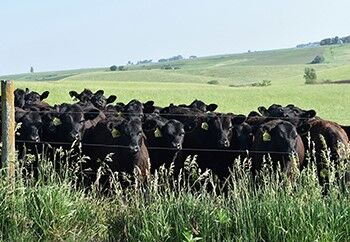New research results will be told at a Sept. 17 field day at the University of Missouri Thompson Farm, Spickard.
Woodland improvements on a beef farm will be the newest show-and-tell at the annual event, says Jon Schreffler, MU farm manager.
Wooded acres now provide income from timber harvest. Dusty Walter, MU forester, will share management tips. That will be seen first on wagon tours, which start at 4 p.m. The lead talk will be on the impact of deer on planted trees. Ways to control damage will be told.
Most of the 10 topics feature beef reproduction and genetics. Those studies from the farm, starting 22 years ago, led to farmer profits from Show-Me-Select replacement heifers. Management and genetics combine to boost herd incomes.
The Thompson field day starts with registration at 3:30 p.m. A beef dinner will be at 6 p.m. Exhibits can be seen then.
This year, drought helped decide topics. Eric Bailey, MU Extension nutritionist, joins the program for the first time. He will talk twice.
His first talk tells about getting weight gain on calves in drought. Next, he gives tips on feeding cows when hay is scarce.
The MU research farm plays a part in MU Extension and in teaching graduate students. They will tell of their research.
An ongoing study uses hair shedding scores to find heat-tolerant cattle. Harly Durbin, in animal science genetics, tells of this tool.
Emma Knickmeyer, graduate student in reproduction, tells of split-time insemination of heifers. That improves conceptions.
Troy Rowan studies the DNA test “GeneMax Advantage.” He’ll tell how that works to rate heifers.
Jordan Thomas joins the program this year as an MU Extension beef specialist. He’s new in that job after getting his Ph.D. working at Thompson with David Patterson, MU beef reproduction specialist.
Beef economics is always popular. Scott Brown, MU beef economist, gives his outlook at 7:45 p.m. to end the program.
After the opening 4 p.m. wagon tour, Chris Daubert will give a welcome. He is dean of the MU College of Agriculture, Food and Natural Resources.
The research farm is in northwestern Grundy County. It’s 7 miles west of Spickard at the end of Highway C. For those using a GPS guide, plug in 668 Highway C, Spickard.



